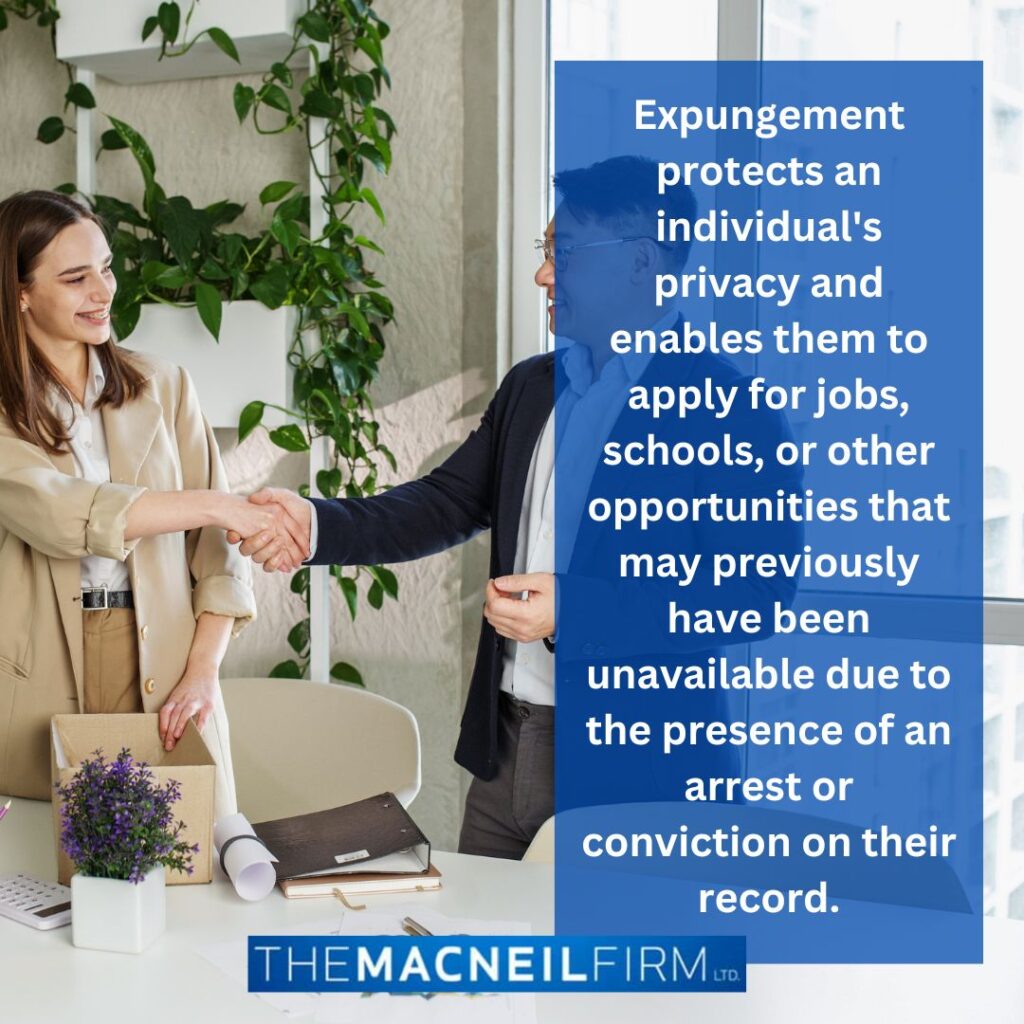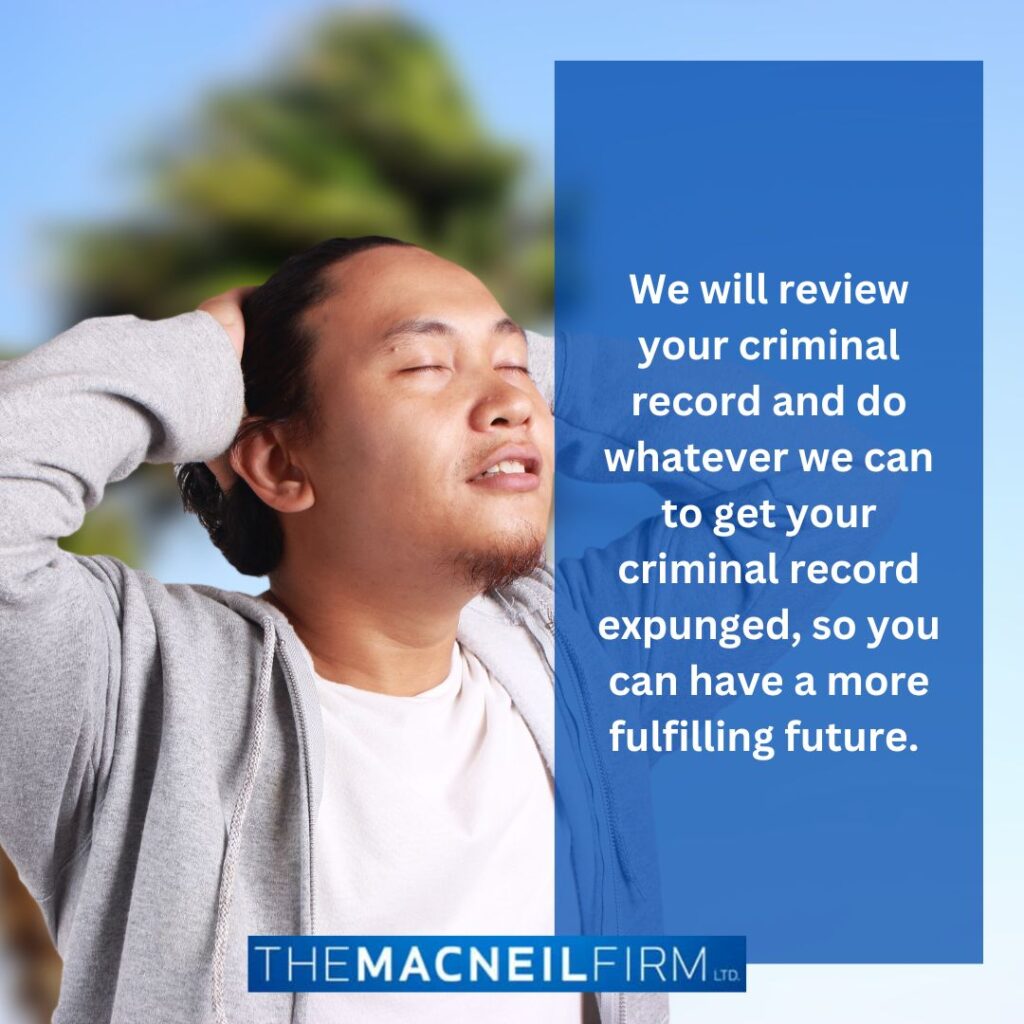Expungement is a process by which a person that has been arrested, or has a criminal background, petitions the court to remove any evidence of the offense from the court records, as well as any law enforcement databases. If the petition to expunge is granted and the record is expunged, the records are generally destroyed, or returned to the petitioner. It can be very helpful to have our expungement lawyers on your side to help you navigate this legal process. The MacNeil Firm knows that your future is at stake and we want to do everything we can to help you.
Many people think that any types of offense can be expunged if you just wait long enough. This is a common misconception. There are very limited circumstances under which cases can be sealed or expunged. This process is governed by statute, and it’s limited to situations where cases were dismissed or special were given types of probation, such as situations where judgment was withheld.
No records are ever automatically expunged. If you want your records to be expunged or sealed, you have to take the affirmative action of filing a petition with the court. Juvenile records are not expunged automatically, either. However, the general public does not have access to those juvenile records. You could say that a juvenile record is automatically sealed, because certain people such as law enforcement or state’s attorneys can see those records, but the general public cannot.
Expungement vs. Sealing a Record
Normally, some types of offenses cannot be completely erased or expunged. However, they can be sealed. Sealing a case hides the details of the offense from most people in the general public, but it does not remove all evidence of the arrest or crime. The Illinois State Police would generally still have access to your records. This is a good alternative if full expungement is not available. The types of situations that can get sealed are even fewer than can be expunged, but it’s worth exploring if you are found to be ineligible for expungement.
Eligibility for Expungement
For the most part, any arrest without a conviction can be expunged, such as if you were arrested and they dropped the charges. Additionally, if you were sentenced on a misdemeanor case to what is commonly referred to as court supervision, most of those offenses can be expunged as well. It’s so important to get records like this expunged because they can be a serious barrier when it comes to things like applying to rent properties or applying for jobs.
Most employers can now carry out background checks, which tell them if you have a criminal record. They will then be likely to turn you away.
Unfortunately, most felony cases cannot be expunged though and will likely show up on an employment background check, as well as a tenant background check. Felony cases that are eligible for expungement are generally cases where you were sentenced to a special type of probation. Overall, the rules are complicated and change frequently, so it’s best to get a copy of your criminal record and talk to our expungement lawyers as soon as possible.
Your criminal history can affect your ability to expunge certain charges. For example, let’s say you have been arrested and sentenced for 2 different cases. One of them is eligible for expungement, and the other is not eligible for expungement. The fact that you have one offense that is not eligible makes them both ineligible for expungement. It really isn’t fair and doesn’t make any sense, but unfortunately that’s the law. Get help from our experienced expungement lawyers in Illinois if you have an ongoing criminal case.
Expungement Timeline
From the time you file a petition, it usually takes a few months to have the petition heard in court. However, if you are arrested in Chicago, it can take up to a year to have the case heard. That’s because they have many more cases than any other arresting agency.
In Illinois, the State and its agencies, such as the Illinois State Police and the state’s attorney, get a chance to object to your petition. These agencies get 60 days to do so, which can make the process take longer. In many cases, the agencies simply forward expungement packets on with recommendations to expunge. However, sometimes the agencies object.
If someone objects to your expungement petition, you may be entitled to a hearing. The good news is that our expungement lawyers can represent you at that hearing. When your petition for expungement ends up on a judge’s desk, they review the whole packet, which includes recommendations or objections from interested parties, before making a decision.
The Expungement Process
The process requires filing a petition with the court and like most court documents you have to give notice because you are asking for a hearing. You have to provide notice to the state’s attorney, the police department that arrested you, to the city attorney of the municipality that you were arrested in, and to the Illinois State Police. Once you have filed notice with all of these people then you have those entities or individuals that can object to your expungement if they so choose.
After you file your petition and you send out your notices, the court will assign a court date. Every county or jurisdiction is slightly different. Some require you to appear in court and some do not. Ultimately after your hearing if the court grants your petition for expungement they usually mail a copy of the order to you or your attorney and then you’ll receive letters indicating that they are complying with the order and they’ve expunged it. You’d also get notice at that time if the court had denied your petition to expunge.
Our expungement lawyers are here for you
If your record was successfully expunged, nothing would appear on your criminal history. It would be empty, your record is wiped clean. For 99% of the people that are going to go looking, they are not going to see anything. One thing that you do have to be concerned about is that if you were arrested, and that was somehow reported on the internet, that is not wiped clean by an expungement. As of right now, there really is no good way to clean off a news story or police blotter of your arrest. However, it is still beneficial for employment, housing, and educational opportunities to pursue expungement when you can.
Your chances are higher if you have expungement lawyers handling the process for you. We have successfully expunged dozens of arrests for our clients. Contact The MacNeil Firm today for a free consultation.



